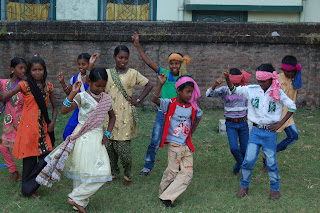Jem and Brydie have chosen kittens and puppies wearing Santa
hats for the Christmas cards they’re giving to all their friends at school.
“Yappy Holidays!”
barks one.
“Have yourself a furry little Christmas,” mews another.
“Please can we ditch the Santa hat, it’s demeaning...” says a
third, deadpan.
Well. It
doesn’t, but it wants to.
Brydie is despatching greetings with military
precision.
“Can you do some Mum? My arm’s getting a bit sore,” she
says, flicking me another envelope to write a name on.
“I think it’s kinda nice if it’s got your writing on it,” I
tell her.
“But it’s getting boring,” Brydie says frankly. Fair enough. She’s done about 16 already.
“Maybe if you think hard about the person you’re sending it
to and pack some good wishes for a very happy Christmas into the card, that’ll
help?”
“Not everyone’s going to have a Happy Christmas though, are
they?” says Brydie matter-of-factly, still showering flamboyant ticks across her list.
Jem looks up from her card-writing thoughtfully. “That’s very true, Bry. Not everyone has a happy Christmas.”
“Hmmm,” says Brydie.
“What sort of things are going to make them sad, d’you think?”
We name a few things.
Not being with the people you love. Not having enough money for presents. Having to be photographed for next
year’s Christmas cards wearing a red Santa hat that cuts off the circulation to
your ears. And conversation turns
to Sandy Hook Elementary School. Mothers, fathers, brothers, sisters and
grandparents who will have a sad Christmas for all eternity, remembering the
day a little person didn’t come home from school.
We haven’t spoken about it much over the last few days. But now sitting at the table, each of
us with a pile of cards, it all comes out. We talk about what could possibly make a person so sad and
angry they’d kill their own mum and a whole lot of six year olds they don’t
even know. We talk about guns and
why it’s so easy to get them in America and why gun control is different in
Australia. We talk about the death
penalty and whether it’s merciful to have your life ended if you face guilt,
bitterness, life in prison- or whether a person’s life is always worth
saving. We talk about how
hard it is to know what’s going on in another person’s life when they’re quiet
at school or mucking up and where their sadness and anger could lead. We wonder what it might feel like
to be the quiet, withdrawn kid who nobody really knows and how it feels now to
be his father and his brother. And
we give Adam Lanza his name along with the name of Victoria Soto, the teacher who protected
her class and was killed.
Because names are important.
Now it’s midnight and I’ve just snuck out of their bedrooms where the pair of them lie in the half-light, curled in the familiar positions
I know and love. I’ve knelt by their
beds to watch them, kiss them, stay longer than I need to re-arrange a bear
with an adventurous spirit. They
are six and eleven and they are here with me, turning days to memories in the
blink of an eye, but with me. Just
every now and then the gift of the two of them leaves me with a tight chest; a choking fear that it's all going too fast and at any moment this could all end. And I wonder if I’ll have loved it
enough?
Brydie tells us she’s going to live with us forever. I remember Jem saying the same thing
when she was six- she’s recently graduated to living nearby with quite a few
cats and possibly a handsome character from a Jane Austen novel. There are days you want to just freeze
time, before forever becomes now.
Time isn’t the enemy.
But the only way to make it a friend is to remember, I guess, that
nothing lasts forever- not great happiness, not great sorrow. All I can think right now is that love
is stronger than death and that we have love to give: to the ones we hold in
the quiet dark, to the ones who are stretching their wings, growing and changing, and especially to the quiet ones we
barely know and the ones we may never meet.
Time.
Time.
Love.
Give.










